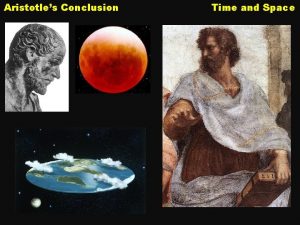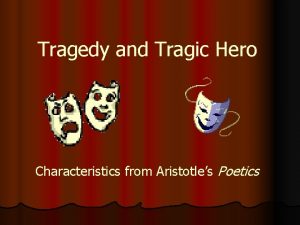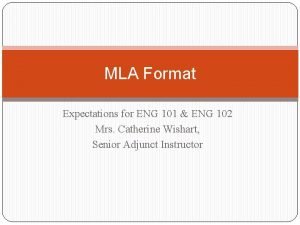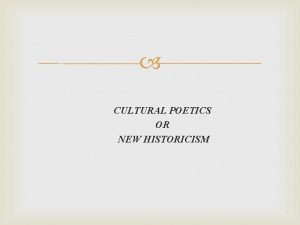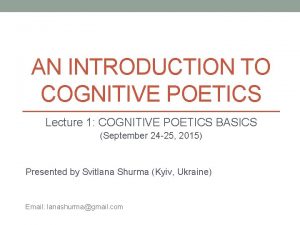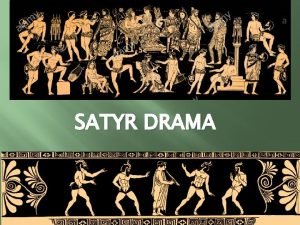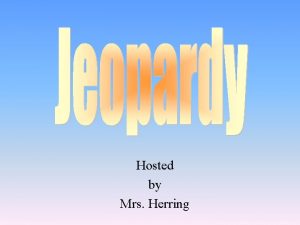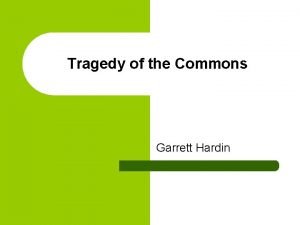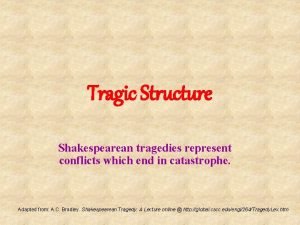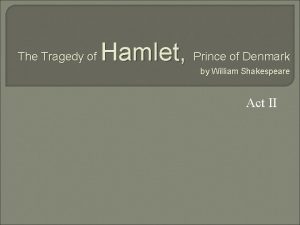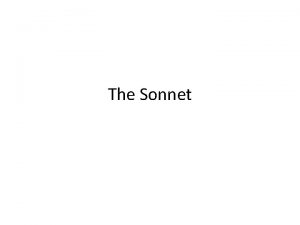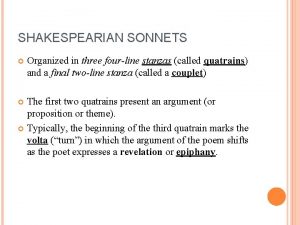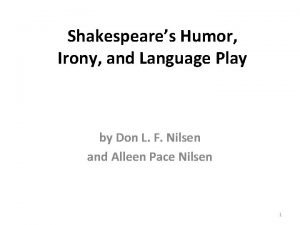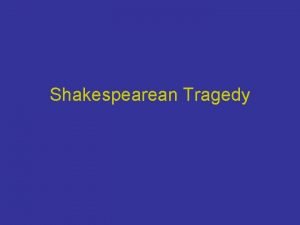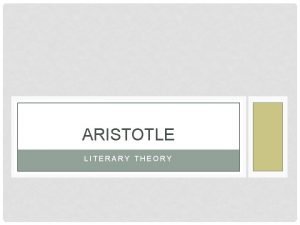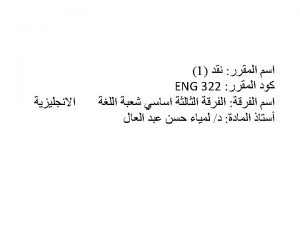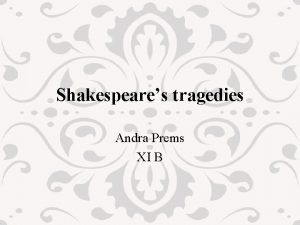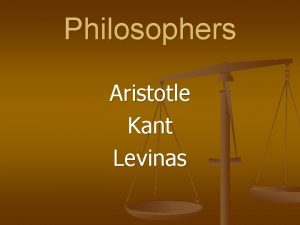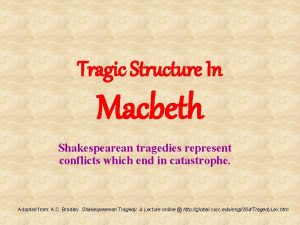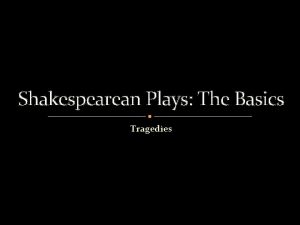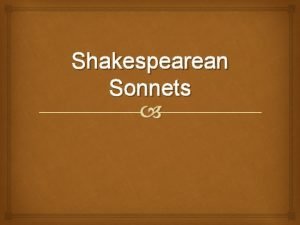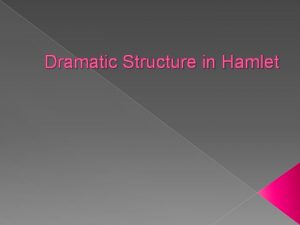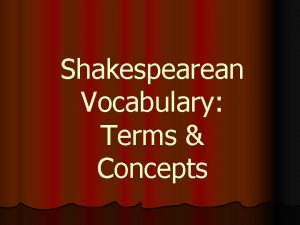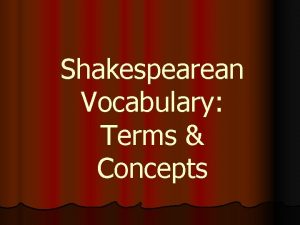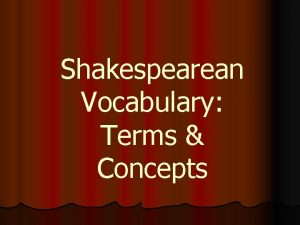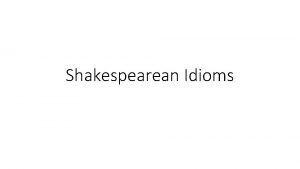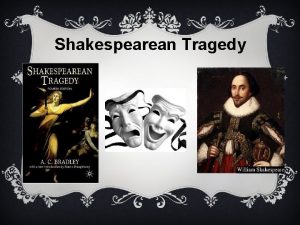8 THE SHAKESPEAREAN TRAGEDIES DEFINITION Aristotle Poetics a





















- Slides: 21

8. THE SHAKESPEAREAN TRAGEDIES

DEFINITION • Aristotle, Poetics = a violation and reassertion of order, producing katharsis (a cleansing of the soul) through pity and fear • A. C. Bradley = “ a story of exceptional calamity leading to the death of a man in high estate“ ( The Shakespearean Tragedy, 1904)

DRAMATIC FUNCTIONS • moral • psychological • metaphysical • religious • entertainment

SINNING AND BEING SINNED AGAINST • • • choice sin retribution horror death Clown: "O! thereby hangs a tale. " Othello, III. 1 Judith Marie Bergen Armando Duran

PLOT Stages: • exposition ( Act I ) • conflict • crisis • climax ( Act II, III and IV) • dénoument ( Act V)

TECHNICAL DEVICES Maynard Mack, The Jacobean Shakespeare, 2006 • parallel plots (the story of Gloucester in King Lear ) • the recapitulation of a motive (poisoning in Hamlet) • emblematic entrances and exits

TECHNICAL DEVICES • oscillation of conflicts • rises and falls in tension • comic scenes created by fools or lower characters ( the gravediggers in Hamlet, the porter in Macbeth, the peasant bringing the vipers in Antony and Cleopatra ). • dialogues, monologues, soliloquies, and asides alternate with greater frequency • prose and poetry

CHARACTERS • The tragic hero with a flaw ( hamartia ) • Irresolution, credulity, pride, jealousy, or ambition associated with power, courage and intelligence attain such a terrible force that they explode, destroying not only the lives of the heroes but also the order of the family, state, and cosmos. Desdemona: "Heaven keep that monster from Othello's mind!" (III, 4)

CHARACTERS Maynard Mack, The Jacobean Shakespeare : 1. the delineation of the main character; 2. the antithesis, i. e. the evolution of the character into his exact opposite, generally symbolized by a journey he undertakes ( Lear to Dover, Othello to Cyprus, Hamlet to England, etc. ) ; 3. the synthesis, i. e. the recovery of his initial virtuous nature, together with the discovery he makes as a form of epiphany or illumination. A necessary exercise in morality. The cycle is painful because the hero also endures a hideous vision of the abysmal “nothingness” of the soul, associated sometimes with the experience of madness.

FOIL CHARACTERS: THE FOOL • antiphonal effects • fools and villains: clever manipulators of words, good psychologists • fool - a screen for flashes from the hero’s subconsciousness; situated at the bottom of the social hierarchy; serves the forces of peace and order

FOIL CHARACTERS: THE VILLAIN • villain - the principle of evil which corrupts the world; placed at the top ( Macbeth is a king ) or at its margins (Edmund in King Lear is a bastard, Shylock in The Merchant of Venice is a Jew, etc. ); associated with lust, revengefulness, and ambition for destructive purposes

• • • the catastrophic body “of woman born” the absent mother love murder “Shakespeare, our contemporary”: Jan Kott

Peter Ackroyd, Shakespeare. The Biography, 2005, p. 396 • Shakespeare: “master of soliloquies” • introspection and reflection encouraged by letters and writing • interiority: no relation to the action • added or removed easily

HAMLET, I, 2 O, that this too, too solid flesh would melt, Thaw, and resolve itself into a dew ! Or that the Everlasting had not fix’d His canon ‘gainst self-slaughter! O God! How weary, stale, flat and unprofitable Seem to me all the uses of this world! Fie on't! Ah, fie! ‘tis an unweeded garden,

HAMLET, I, 2 That grows to seed; things rank and gross in nature Possess it merely. That it should come to this! But two months dead! Nay, not so much, not two. So excellent a king that was to this Hyperion to a satyr; so loving to my mother,

That he might not beteem the winds of heaven Visit her face too roughly. Heaven and earth! Must I remember ? Why, she would hang on him As if increase of appetite had grown By what it fed on; and yet within a month Let me not think on't. Frailty, thy name is woman!

HAMLET, I, 2 A little month, or ere those shoes were old With which she followed my poor father's body, Like Niobe, all tears - why she, even she O God! A beast that wants discourse of reason Would have mourn'd longer - married with my uncle,

HAMLET, I, 2 My father's brother; but not more like my father Than I to Hercules. Within a month, Ere yet the salt of most uprighteous tears Had left the flushing in her galled eyes, She married.

O, most wicked speed, to post With such dexterity to incestuous sheets! It is not, nor it cannot come to good. But break my heart, for I must hold my tongue. (I, 15: 57)

O, that this too, too solid flesh would melt, Thaw, and resolve itself into a dew ! Or that the Everlasting had not fix’d His canon ‘gainst self-slaughter! O God! Ah! Carnea asta mult, mult prea vârtoasă De s-ar muia, topi şi face rouă! De nu oprea, prin legea lui, Cel veşnic Răpunerea de sine! Doamne, Doamne! (L. Leviţchi, D. Duţescu)

O, that this too, too solid flesh would melt, Thaw, and resolve itself into a dew ! Or that the Everlasting had not fix’d His canon ‘gainst self-slaughter! O God! O trupu-mi prea-prea greu de s-ar topi În valuri, prefăcute-apoi în rouă, Sau Veşnicul de n-ar fi pus canon Pe suflet biet de sinucis! O, Doamne! Vl. Streinu “carnea asta de păcate” – Dragoş Protopopescu
 Shakespearean drama characteristics
Shakespearean drama characteristics Aristotle concluded that earth was round because
Aristotle concluded that earth was round because Aristotle poetics tragic hero
Aristotle poetics tragic hero Aristotle poetics mla citation
Aristotle poetics mla citation Poetics of culture
Poetics of culture New criticism definition
New criticism definition What is cognitive poetics
What is cognitive poetics What is a tragedy literature
What is a tragedy literature Satyric drama
Satyric drama Hypocrite origin
Hypocrite origin Elizabethan tragedies were modeled on plays from
Elizabethan tragedies were modeled on plays from Tragedy in the commons
Tragedy in the commons Definition of shakespearean tragedy
Definition of shakespearean tragedy Greek tragedy vs shakespearean tragedy
Greek tragedy vs shakespearean tragedy The structure of a shakespearean tragedy
The structure of a shakespearean tragedy Ophelia monologue o my lord
Ophelia monologue o my lord Sonnet qualities
Sonnet qualities Shakespeare sonnets are organized in
Shakespeare sonnets are organized in Shakespearean comedy vs tragedy
Shakespearean comedy vs tragedy Shakespeare's tragic heroes
Shakespeare's tragic heroes Shakespeare sonnet about love
Shakespeare sonnet about love Quatrain shakespeare
Quatrain shakespeare

